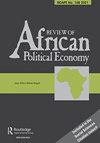The expansion of capitalist agricultural production and social reproduction of rural labour: contradictions within the logic of capital accumulation in Mozambique
IF 1.6
3区 社会学
Q1 AREA STUDIES
引用次数: 1
Abstract
ABSTRACT In Mozambique, policy discourses supporting the expansion of large-scale capitalist agriculture have largely focused on its potential to increase agricultural production and productivity. In particular, they have highlighted the potential contribution to rural employment and income, and their impacts on poverty reduction. Yet in focusing narrowly on these dynamics, they have ignored the contradictions of social reproduction of labour often associated with the expansion of capitalist production. This paper explores these contradictions by considering primary and secondary evidence from two contexts of expansion of large-scale capitalist agriculture in Mozambique. It argues that these contradictions have manifested in diverse forms, reflecting the extent to which forms of expansion and (re)organisation of sectors of capitalist agricultural production, and the associated forms of labour exploitation, have affected different spheres of social reproduction of labour in these contexts. Moreover, the paper suggests, they have reproduced more broadly, as the expansion/intensification of the extractive logic of accumulation has compromised ‘alternative’ spaces of social reproduction.资本主义农业生产的扩张与农村劳动力的社会再生产——莫桑比克资本积累逻辑中的矛盾
摘要在莫桑比克,支持扩大大规模资本主义农业的政策话语主要集中在其提高农业生产和生产力的潜力上。他们特别强调了对农村就业和收入的潜在贡献及其对减贫的影响。然而,在狭隘地关注这些动态时,他们忽略了劳动的社会再生产的矛盾,这些矛盾往往与资本主义生产的扩张有关。本文从莫桑比克大规模资本主义农业扩张的两个背景出发,通过主要证据和次要证据来探讨这些矛盾。它认为,这些矛盾表现为多种形式,反映了资本主义农业生产部门的扩张和(重组)组织形式以及相关的劳动力剥削形式在多大程度上影响了这些背景下劳动力社会再生产的不同领域。此外,论文表明,由于积累的提取逻辑的扩展/强化损害了社会再生产的“替代”空间,它们的再生产范围更广。
本文章由计算机程序翻译,如有差异,请以英文原文为准。
求助全文
约1分钟内获得全文
求助全文
来源期刊

Review of African Political Economy
Multiple-
CiteScore
3.00
自引率
7.70%
发文量
29
期刊介绍:
The Review of African Political Economy (ROAPE) is a refereed journal committed to encouraging high quality research and fostering excellence in the understanding of African political economy. Published quarterly by Routledge, Taylor & Francis Group for the ROAPE international collective it has since 1974 provided radical analysis of trends and issues in Africa. It has paid particular attention to the political economy of inequality, exploitation and oppression, whether driven by global forces or local ones (such as class, race, community and gender), and to materialist interpretations of change in Africa. It has sustained a critical analysis of the nature of power and the state in Africa.
 求助内容:
求助内容: 应助结果提醒方式:
应助结果提醒方式:


